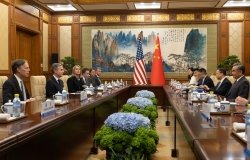Permanent Allies? The Canada-U.S. Defense Relationship in the 21st Century
In a discussion of the Canada-U.S. defense relationship, Andrew Richter argued the relationship is in decline. He noted that Canada’s decision in 2005 to not join the U.S. missile defense plan particularly marked this shift.
Overview
The Canada-U.S. defense relationship is in decline, argued Andrew Richter, associate professor of political science at the University of Windsor and Fulbright-Woodrow Wilson Center Visiting Research Chair in Canada-United States Relations, at a panel discussion hosted by the Canada Institute on November 26, 2007. Drawing from his current research on the subject, Richter maintained that Canada's decision not to participate in the United States' missile defense plan, in tandem with the country's declining military capabilities, as well as changing political dynamics in both countries, represent the principal causes behind the decline of the longstanding Canada-U.S. defense relationship. The program provided a timely opportunity for U.S. and Canadian government officials, as well as academic experts, to assess the current status and future direction of the bilateral defense relationship.
Analyzing the Factors behind a Declining Defense Relationship
Canada's 2005 decision not to participate in the U.S. missile defense plan represented a "watershed moment" in the Canada-U.S. defense relationship, said Richter. Historically, Canada has followed the United States' lead on major continental security initiatives from the beginning of the two countries' sixty year defense relationship. According to Richter, the decision on missile defense was comparable in importance to the 1958 decision to establish NORAD and the 1963 decision to accept U.S. nuclear weapons. These issues generally come around "once in a generation," and are critical to the United States in determining Canada's willingness to cooperate in the defense of the continent. Thus, Canada's decision not to participate in the missile defense program offers a strong indication of the decline of the bilateral defense relationship overall, he said. Adding to U.S. frustration with the Canadian decision was the fact that the Canadian government had indicated on several earlier occasions that the country would agree to join the missile defense plan. However, several factors may have contributed to Canada's final decision not to participate, including fears that the system was technologically unreliable, had the potential to reignite an international arms race, and was in violation of the Anti-Ballistic Missile Treaty.
Richter described the U.S. reaction to Canada's rejection of missile defense as "muted," but said that Canada's decision did not go unnoticed by the U.S. government. For example, former U.S. Ambassador to Canada Paul Cellucci indicated his surprise and dismay at the decision. Overall, Richter argued that if Canada continues to reject U.S. security initiatives, it runs the risk of discouraging the United States to allow Canada to have a voice in its future plans for continental defense.
Aside from Canada's refusal to cooperate with the United States on missile defense, broader factors are also to blame for the deterioration of the bilateral defense relationship, particularly Canada's declining military capabilities, said Richter. In fact, Canada's percentage of GDP devoted to defense spending has dropped significantly from its peak of six percent in the early 1950s to approximately 1.2 percent under Canada's current government. An increase in defense expenditures, argued Richter, is desperately needed to modernize the equipment currently used by Canada's armed forces. Although the Canadian government has several projects planned or underway to upgrade the country's air force, navy, and army, Richter noted that Canada's annual defense spending would have to increase from its current level of C$18 billion to approximately C$25 to C$30 billion, in order to have sufficient funding to complete the projects currently planned to modernize all three branches of the country's armed forces.
The dynamics of Canada's domestic politics represents a primary reason why such a vast increase in the country's defense spending and a general unwillingness to automatically follow U.S. foreign policy initiatives is unlikely to occur, argued Richter. Quebec represents a particular problem for Canadian policymakers attempting to align themselves closer to the United States; Richter described Quebec as a province that has historically leaned to the left of English Canada and has consistently opposed Canadian involvement in foreign conflicts. With close to one-quarter of the seats in Canada's House of Commons, Quebec enjoys a considerable amount of influence at the federal level, which is often reflected in the foreign policy decisions of the Canadian government.
Nevertheless, Quebec is not the only reason for Canada's recent opposition to U.S. foreign policy objectives, said Richter. In fact, a large majority of Canadians voiced strong disapproval over the United States' refusal to participate in the Kyoto Protocol, the international treaty to ban landmines, and the International Criminal Court. Similarly, Canadians from coast-to-coast have also denounced the Bush administration's preference toward unilateralism and preemption, which was reflected in the Canadian government's decision not to join the U.S.-led Iraq war. Richter argued that this decision highlighted Canada's preference to adhere to UN decisions on international issues, rather than follow the United States' lead on foreign policy initiatives. This trend, he said, will likely remain evident in Canada's future foreign policy decisions and is indicative of the continuing decline of the Canada-U.S. defense relationship. Thus, the foreign policy preferences of both countries are creating tensions, as Canada and the United States are currently emphasizing differing approaches to achieving international peace and stability.
Looking Toward the Future
Although he asserted that the Canada-U.S. defense relationship has suffered significant setbacks recently, Richter noted that he was cautiously optimistic about the future of the bilateral defense relationship. For instance, he said, Canada's current government, led by Conservative party leader Stephen Harper, remains committed to improving the bilateral relationship. In addition, the Canadian government has recently begun to increase its defense budget, which represents a crucial step toward maintaining a force capable of contributing in the international arena. Finally, Richter maintained that Canada's contribution to the NATO mission in Afghanistan has been positively received and appreciated by the United States. He described Canada's contribution in Afghanistan as a "very important factor" in encouraging the United States to view Canada as a reliable defense partner again.
In his closing remarks, Richter stressed that the current tension between Canada and the United States' foreign policy approaches would never escalate to a point where their defense alliance was at risk of ending entirely. A shared border, similar values, and a long history of working together on defense issues will be enough to ensure that the bilateral defense relationship between Canada and the United States will endure. What remains to be seen, argued Richter, is the degree to which Canada and the United States will maintain the "very close" defense relationship the two countries have shared for the past six decades.
Drafted by Ken Crist, Program Associate, Canada Institute
David Biette, Director, Canada Institute
202-691-4270
Hosted By

Canada Institute
The mission of the Wilson Center's Canada Institute is to raise the level of knowledge of Canada in the United States, particularly within the Washington, DC policy community. Research projects, initiatives, podcasts, and publications cover contemporary Canada, US-Canadian relations, North American political economy, and Canada's global role as it intersects with US national interests. Read more
Thank you for your interest in this event. Please send any feedback or questions to our Events staff.










